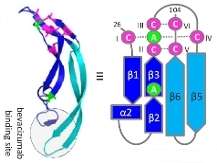Peptide-based vaccination against VEGF results in efficient antitumor activity

A research team including professor Peter Timmerman of the University of Amsterdam's Van 't Hoff Institute for Molecular Sciences (HIMS) has developed a peptide-based vaccine enabling a successful active anti-tumor immunization therapy targeting the growth hormone Vascular Endothelial Growth Factor (VEGF). Suppression of tumor growth has already been established in mice and exploratory studies in patients are now underway at VU Medical Center (Amsterdam). The encouraging preclinical results were published last week in Proceedings of the National Academy of Science.
The vascular endothelial growth factor (VEGF) is a pivotal growth factor for angiogenesis (blood vessel formation) in tumor tissue. Therefore, it has been frequently investigated as a target in anticancer therapy. Its inhibition by the monoclonal anti-VEGF antibody bevacizumab (Avastin) has already improved survival in patients with several types of cancer.
There are, however, limitations to the effectiveness of this passive immunotherapy strategy since it does not stimulate a patient's immune system to actively respond to a disease in the way a vaccine does. The starting point of the research now reported in PNAS is that a VEGF vaccination has the potential to outperform the current clinical anti-VEGF treatment strategies.
Vaccination will not only provide durable VEGF suppression, it is also expected that the induced antibodies will have superior VEGF-neutralizing ability in comparison to bevacizumab. Furthermore, vaccination requires only a few intramuscular injections and reduces the number of hospital visits in comparison to treatment with bevacizumab.
However, vaccination with intact VEGF has major drawbacks such as unwanted biological activity and weak immunogenicity. The strategy pursued in the current research therefore is to use a VEGF mimicking peptide as a vaccine. The major challenge here was to identify the minimal peptide able to generate antisera with potent VEGF-neutralizing capacity and tumor-reducing capabilities.
A total of 33 peptide mimics of VEGF with varying levels of structural complexity (linear, conformational, and discontinuous) were designed, synthesized, and tested for the ability to generate potent antisera. It was established that induction of neutralizing antibodies with tumor-growth-inhibiting power was only successful for a 3-D-structured 79-mer peptide with a fully intact cysteine-knot fold (covering the complete discontinuous binding site of bevacizumab).
Eradication of tumor growth using this peptide was demonstrated in two different tumor models (mice). It thus became clear that enforcing a native-like, secondary structure in the peptide is the key to success for inducing neutralizing anti-VEGF antibodies with tumor-inhibiting power.
Professor Peter Timmerman holds the chair of Protein-mimetic Chemistry at the University of Amsterdam's Van 't Hoff Institute for Molecular Sciences (HIMS). He is Chief Scientific Officer at Pepscan (Lelystad), a global supplier of high quality peptide based products & services. Timmerman and Pepscan developed and patented the peptide-based VEGF vaccination technology in cooperation with professor Tilman M. Hackeng of Maastricht University and Arjan W. Griffioen of VU University Medical Center (VUmc, Amsterdam). The patent was licensed to Immunovo BV (тАШs-Hertogenbosch), a Dutch private biotechnology company engaged in the discovery and clinical development of oncology immunotherapeutics. The Medical Oncology Department of VUmc recently started a phase I clinical trial of the new vaccine in cooperation with Immunovo.
More information: Madelon Q. Wentink et al. Targeted vaccination against the bevacizumab binding site on VEGF using 3D-structured peptides elicits efficient antitumor activity, Proceedings of the National Academy of Sciences (2016). DOI: 10.1073/pnas.1610258113












